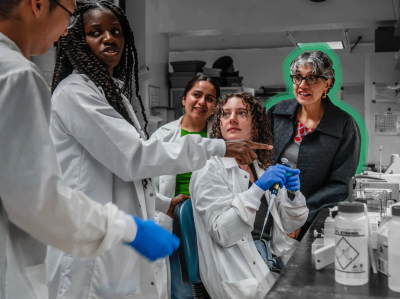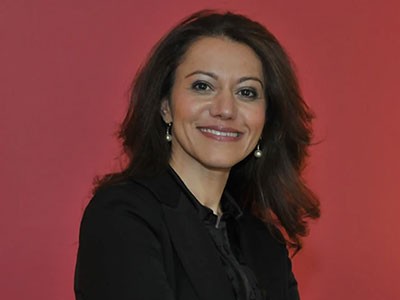Rana Dajani is Palestinian, and grew up in neighbouring Jordan, where she is now a professor of biology and biotechnology at the Hashemite University in Zarqa. She always loved science, but circumstances prevented her from pursuing a PhD until after she had spent ten years teaching and was pregnant with her fourth child.
In recent years, Dajani has initiated research partnerships between Jordan and centres around the world, launched a mentorship programme for mid-career women in the Arab world, created a reading programme to spark kids’ curiosity, served as president of the Society for the Advancement of Science and Technology in the Arab World (SASTA) and been a role model for Muslim women in science.
Her research focuses on epidemiology and genetics, such as identifying a new risk factor for type 2 diabetes for people in two minority populations in Jordan1, as well as investigating genes2 and other biomarkers3 associated with trauma among refugees. Dajani talks to Nature about how she became a scientist, her efforts to promote diversity at the individual and institutional levels, why she stands up for justice and how she supports women in science.
What is the great passion that has driven you as a scientist?
I grew up in a family where we read a lot. We didn’t have a television. My father was a physician and scientist, so every night we would read Scientific American or National Geographic together. I was also inspired by my Islamic upbringing, which encouraged me to celebrate my curiosity and ask questions. This cultivated a passion inside me very early — I wanted to be a discoverer and explorer. But exploring takes money and access to travel opportunities, which I did not have growing up in Jordan. I liked mathematics, physics and biology and I decided that if I couldn’t explore in person, I could at least make discoveries inside cells and be a pioneer at that frontier. I get a thrill from trying to understand how molecules interact and how cells communicate.
‘I saw that discrimination wasn’t hearsay or rumours — it really did exist’
I got a master’s degree in Jordan in 1992, but there were no PhD programmes there at the time. I was accepted by the University of Cambridge, UK, for a PhD around 1990, but I couldn’t afford to go. Instead, I became a biology and science teacher. After nearly ten years, my husband saw an advert in a newspaper for a Fulbright scholarship, which provides merit-based support for study and research in the United States. He said: “Here’s your opportunity.”
My Fulbright interview in Amman, Jordan, was on the due date for my fourth child and I had my baby the next day.
My husband resigned as a lieutenant colonel in the Jordanian Air Force, because we didn’t want to split the family. We all went together to the United States, where I went to the University of Iowa in Iowa City for my PhD in cell and molecular biology in 2000.
How have you dealt with gender bias in your personal and professional life?
Although up to 57% of all science, technology, engineering and maths (STEM) graduates in Arab countries are women, women are still under-represented as researchers and professors: in 2018, 41% of researchers in Arab countries were women.
Women globally face inequities for many reasons, one being that they tend to be family caretakers. How do you balance that with wanting to share your ideas with peers, pick their brains or discuss a scientific article?
Men do it by staying at work in the evening, but most women don’t have that time. That’s what inspired me to create my mentoring programme, called the Three Circles of Alemat. ‘Alemat’ in Arabic means female scientist, and the three circles are local, regional and global.
Collection: Changemakers in science
We gather early- to mid-career female scientists and do a kind of ‘speed dating’ to find people who click. Then, it’s up to the pair to decide how to communicate and how often. Together, they discover how to support each other personally and professionally. As an example, one of the early-career scientists was pregnant and had to spend time in hospital. Her mentor advised her to put herself and her family before her career, and kept supporting her until she went back to work.
We also created an online toolkit in Arabic and English that anyone can use.
It has always bothered me that women don’t have enough role models. Most role models are Western, white men. The next best scenario is white women. We need women who look like us, speak like us and dress like us to inspire young girls to dream, but we also need young boys to support young girls’ right to dream. So, I accept nearly every invitation to give talks, and I encourage other women to make public appearances.
Why do you invest time in diversity, equity and inclusion (DEI) work?
Because I think every human being is different, and so they have a different perspective. And we are better at solving problems together, because you need a diversity of opinions to solve problems creatively.
My involvement in DEI work goes from local to global. Locally, my research teams are always diverse — both men and women, from different backgrounds and ethnicities. And my research is about minority groups: we’re the world experts in the population genetics of Chechens and Circassians, two ethnic populations in Jordan. There are scientists from those populations on my team, as well.
I also brought together people from five institutions and three universities across Jordan to study these two minority ethnic groups as partners with the National Center for Diabetes, Endocrinology and Genetics, a government-affiliated non-profit organization in Amman. I invited epidemiologists, anthropologists, biochemists and physicians to work together as a team to provide health care, education and training.
My path to heading a biotech company
As president of SASTA for the past few years, the biggest thing I’ve done is to create the Global Conference for Diaspora Networks in Science. We worked to harness the potential of scientists in the diaspora groups represented here to do an international ‘brain circulation’ — facilitating networking, cross-border learning and sharing of knowledge.
My mother taught me never to shy away from doing or saying what is right, whatever the cost. I draw my energy and my courage from that integrity, that moral compass. So, today, it’s the Palestinians being treated unjustly. And I’m going to stand up and defend them with everything I have. If, tomorrow, it is a Jewish community, I will do the same.
Whether it’s the conflict in Palestine, climate change, inequality in Africa — it’s all the same equation. It’s all a game of money and power. Solving one problem will help to solve the others. This is not an individual thing. It’s about all of us standing together for humanity and justice for everyone.
What is the best surprise that has come out of your work?
Understanding that we are not only a manifestation of our genetics or of our environment — nature or nurture — but are also a combination of both. We’re not controlled by our destiny. We have the capacity to change and adapt our behaviour — and our gene expression can even change through epigenetics, the environment’s influence on the genes that we inherit from our parents.
To me, that’s just amazing. It gives such hope that even people who have been exposed to the worst possible trauma, some of whom I engage in my research, are sometimes the most wonderful, beautiful people because they have been able to manage all that, because of that adaptability and dignity. Epigenetics can help to shift the mindset from looking at people as victims, to looking at people as agents of change with dignity.
What do you do to get away from science?
You know, when you love science, it’s not about taking a break. But if it’s not science, I’m interacting with people and spending time with family. When my grandchild arrived a year and a half ago, she reset everything inside me.
We get caught up with the challenges of life, but children help to ground us. When you don’t know the right thing to do, just take care of a child: everything else will be taken care of accordingly.


